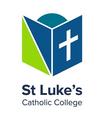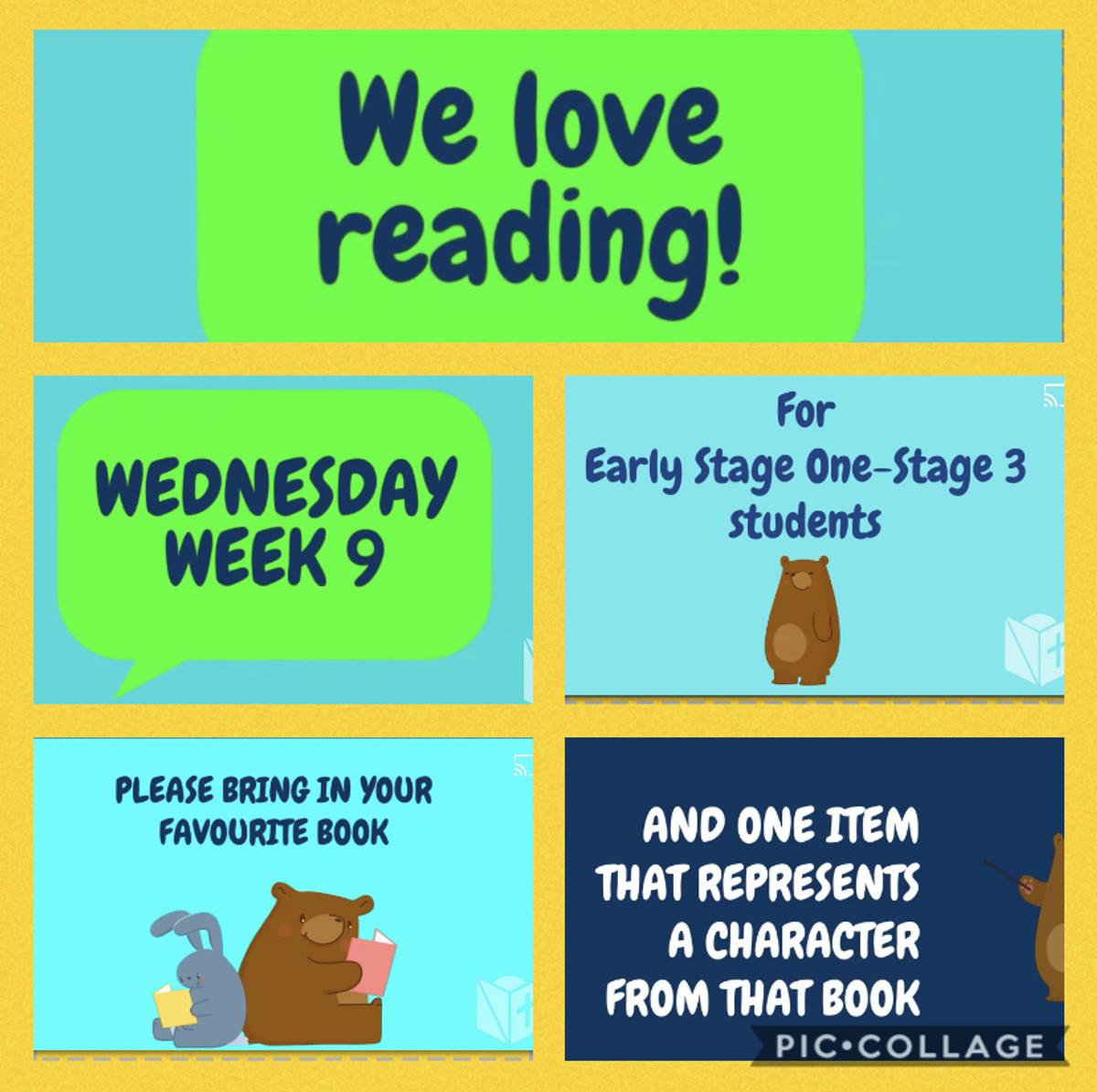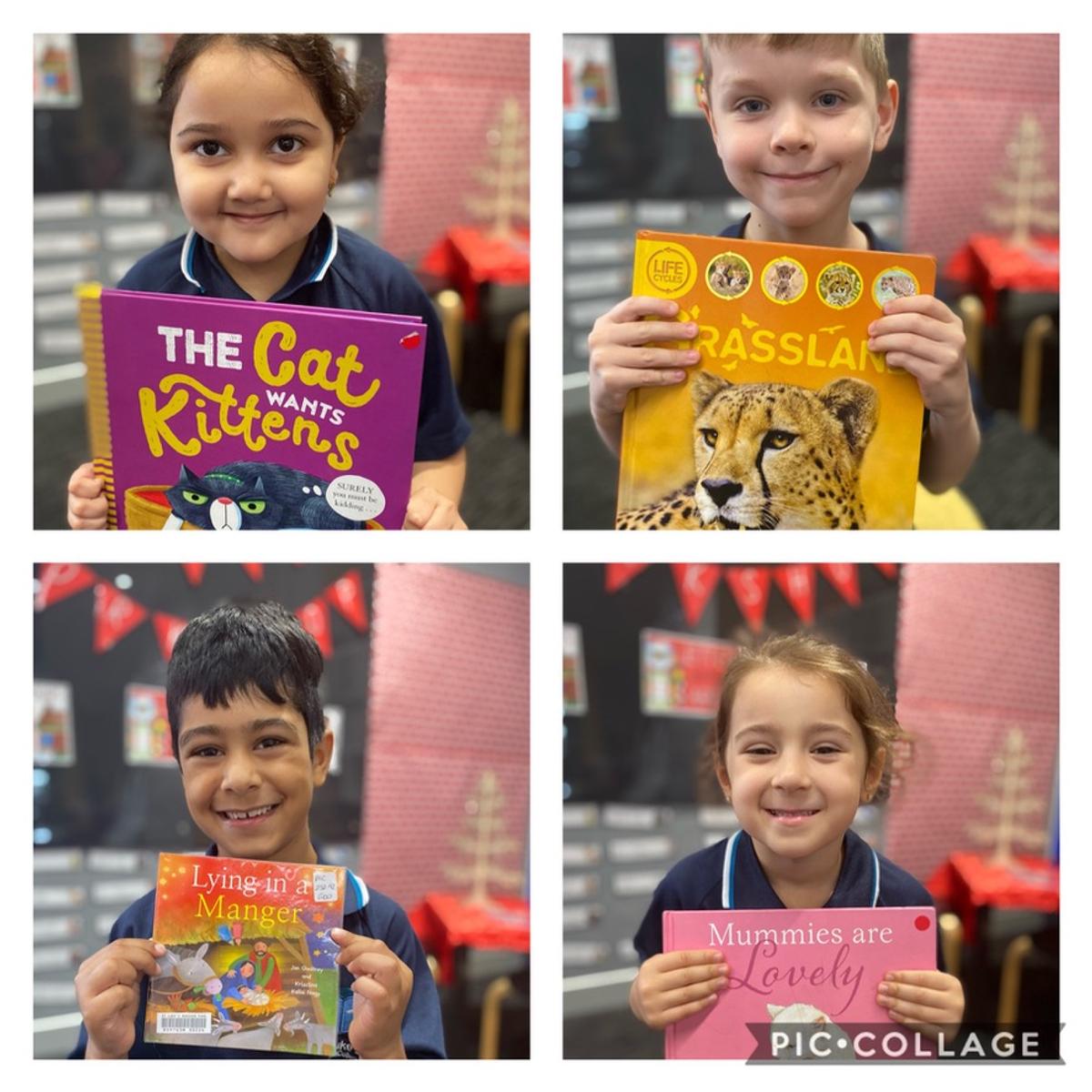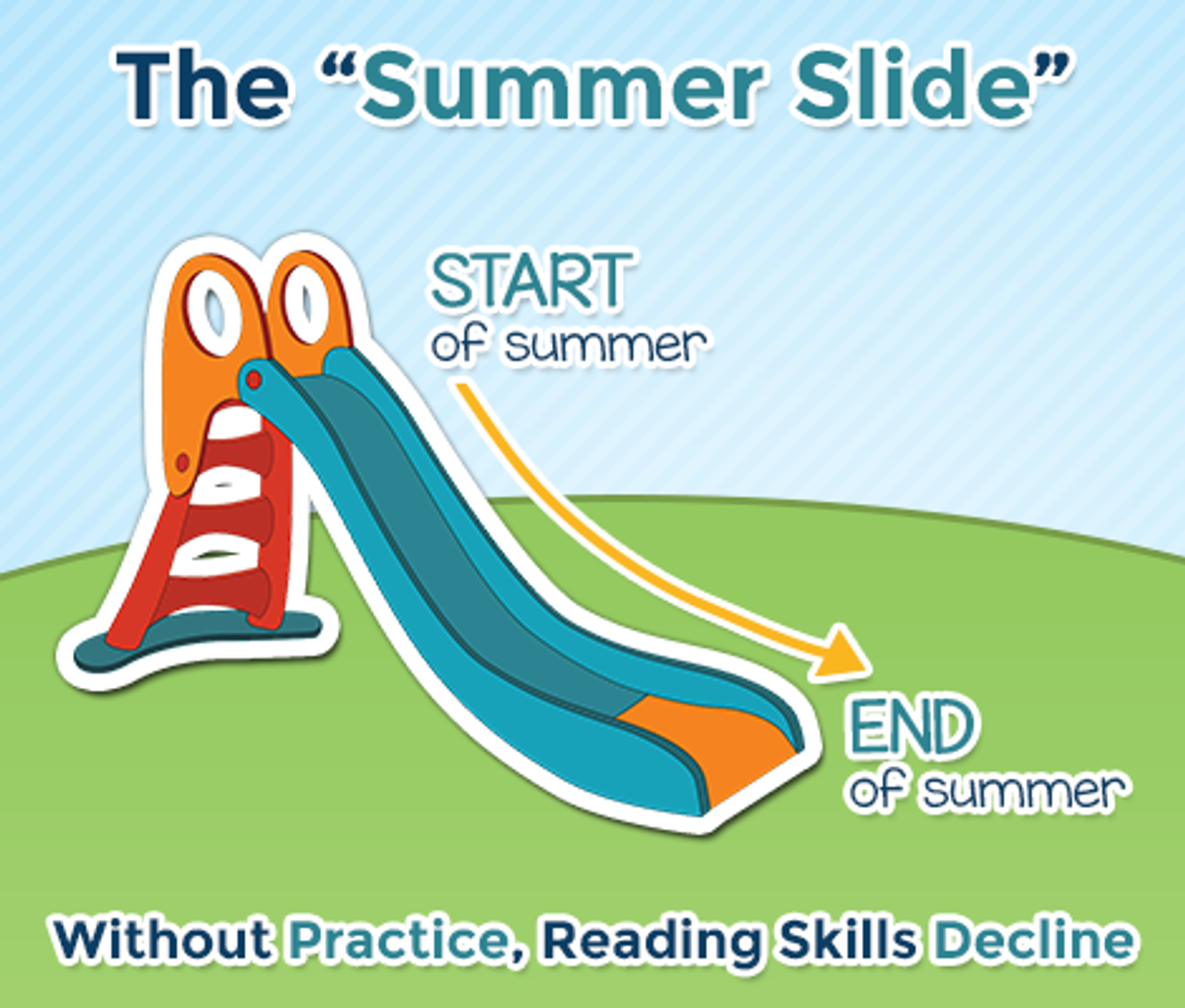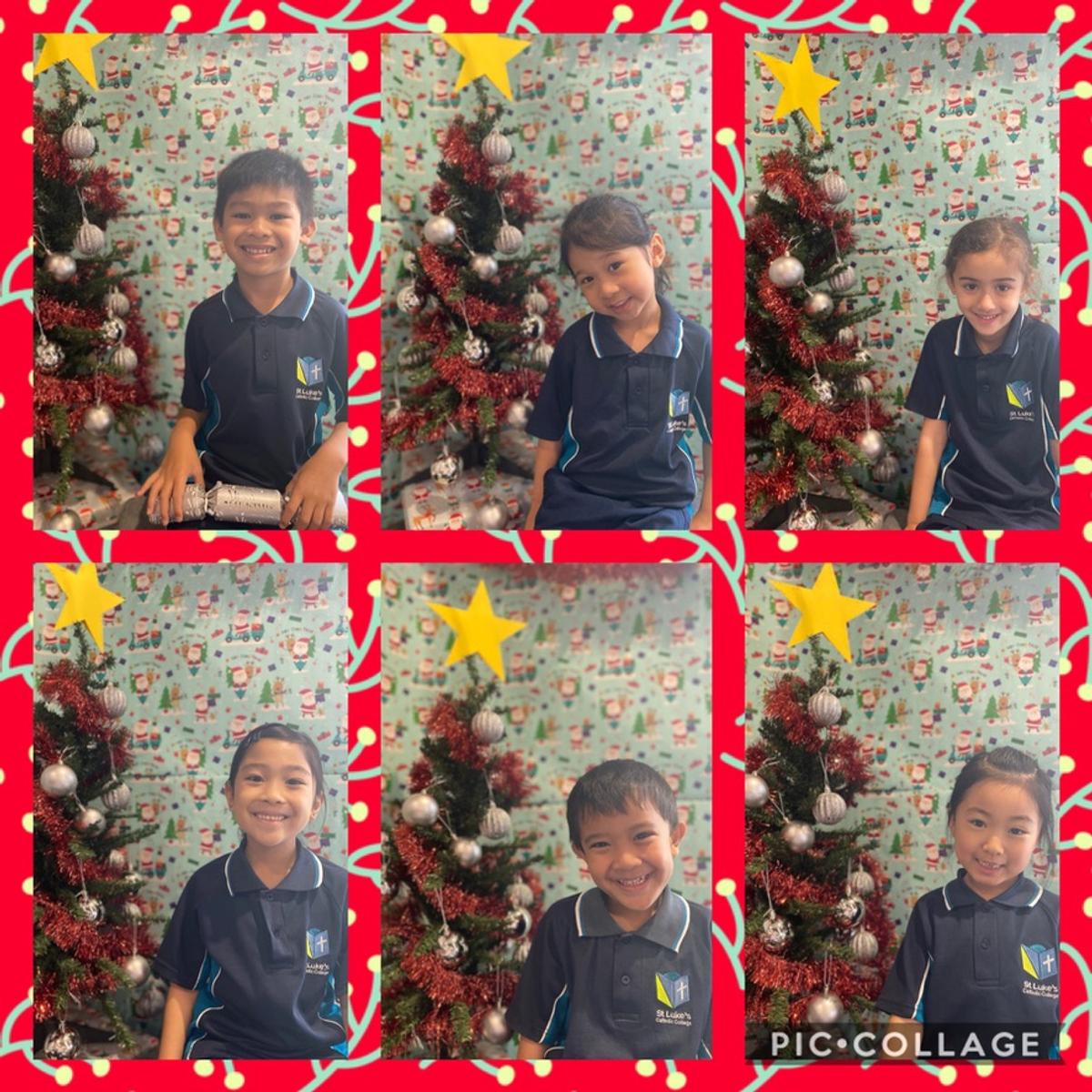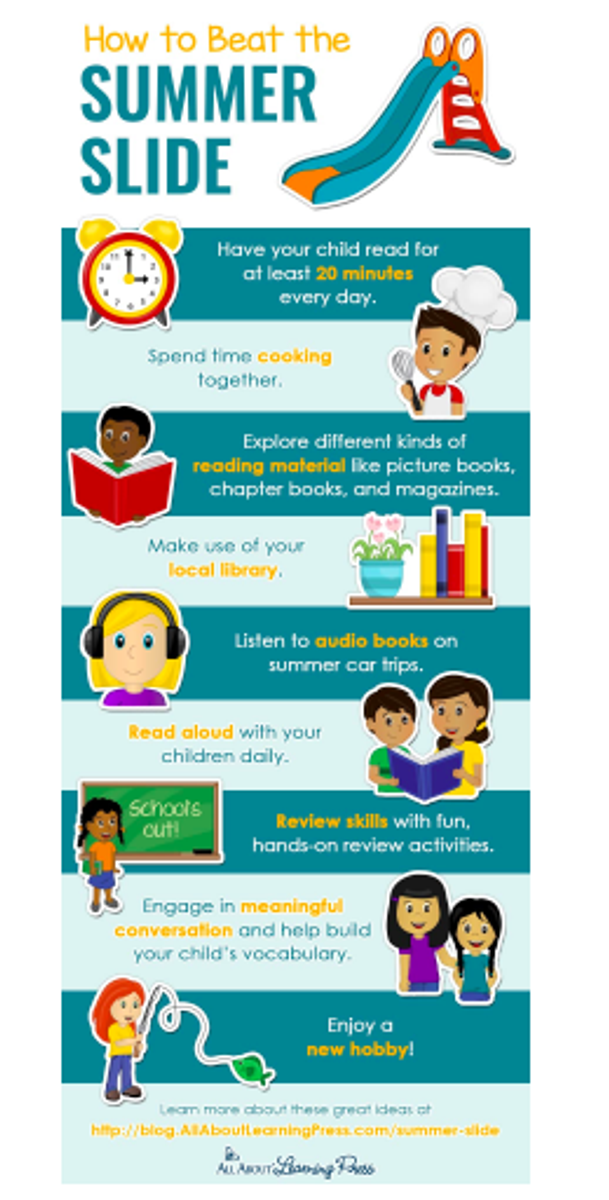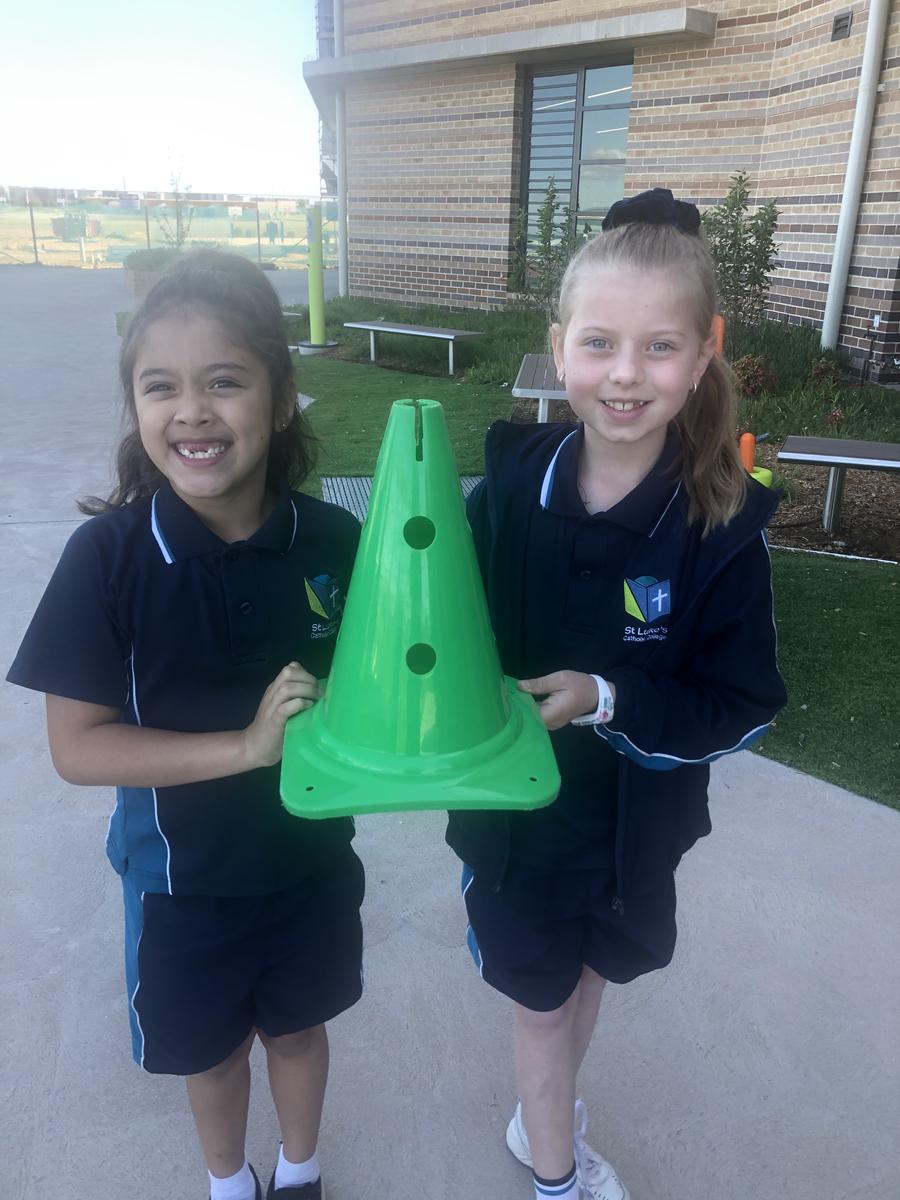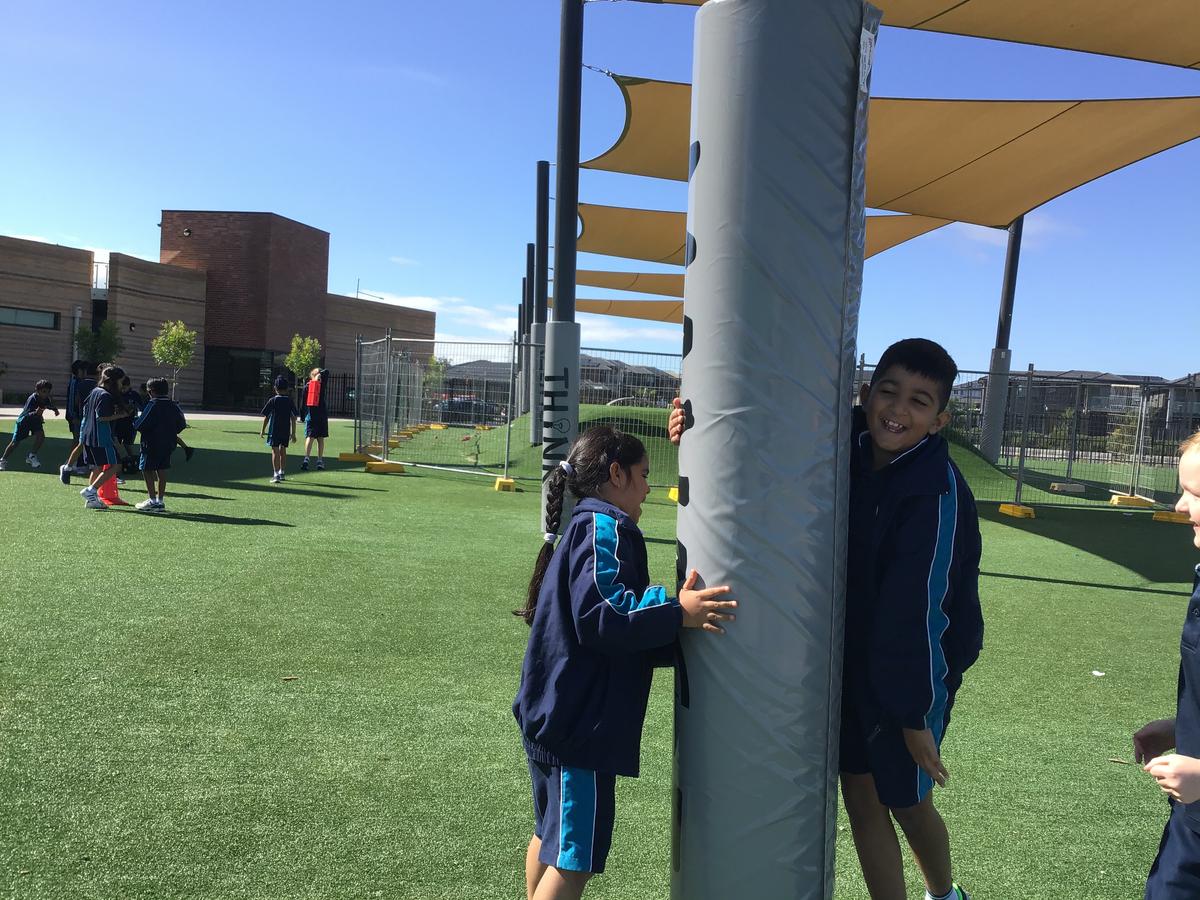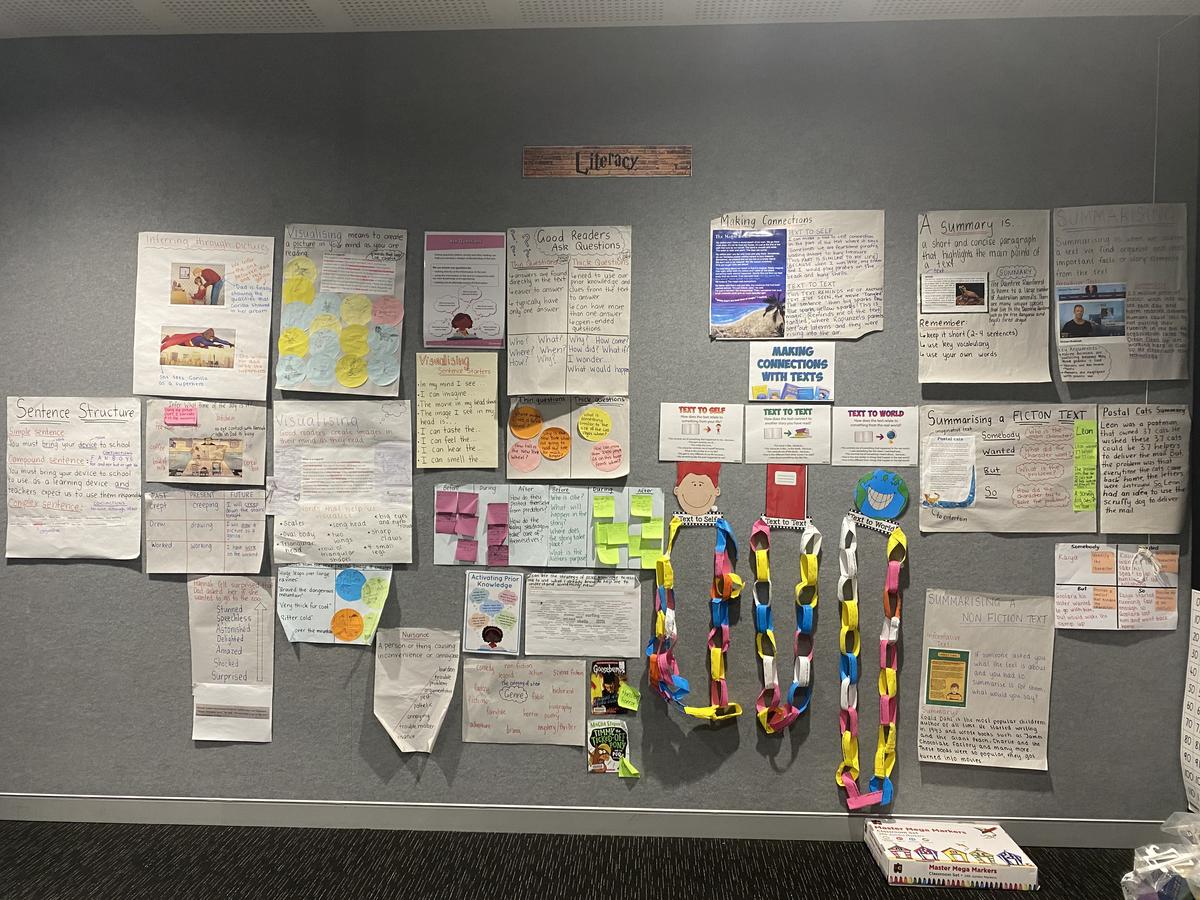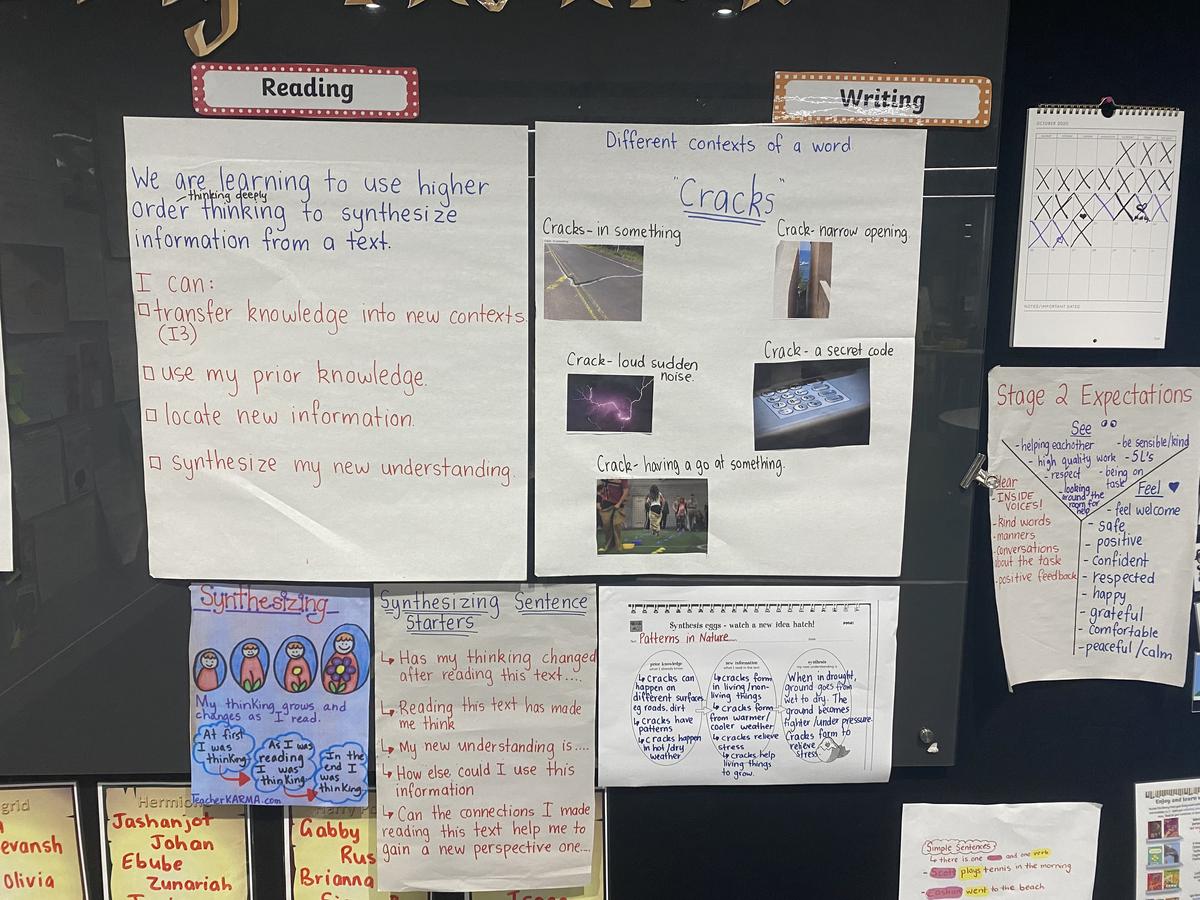School of Foundations
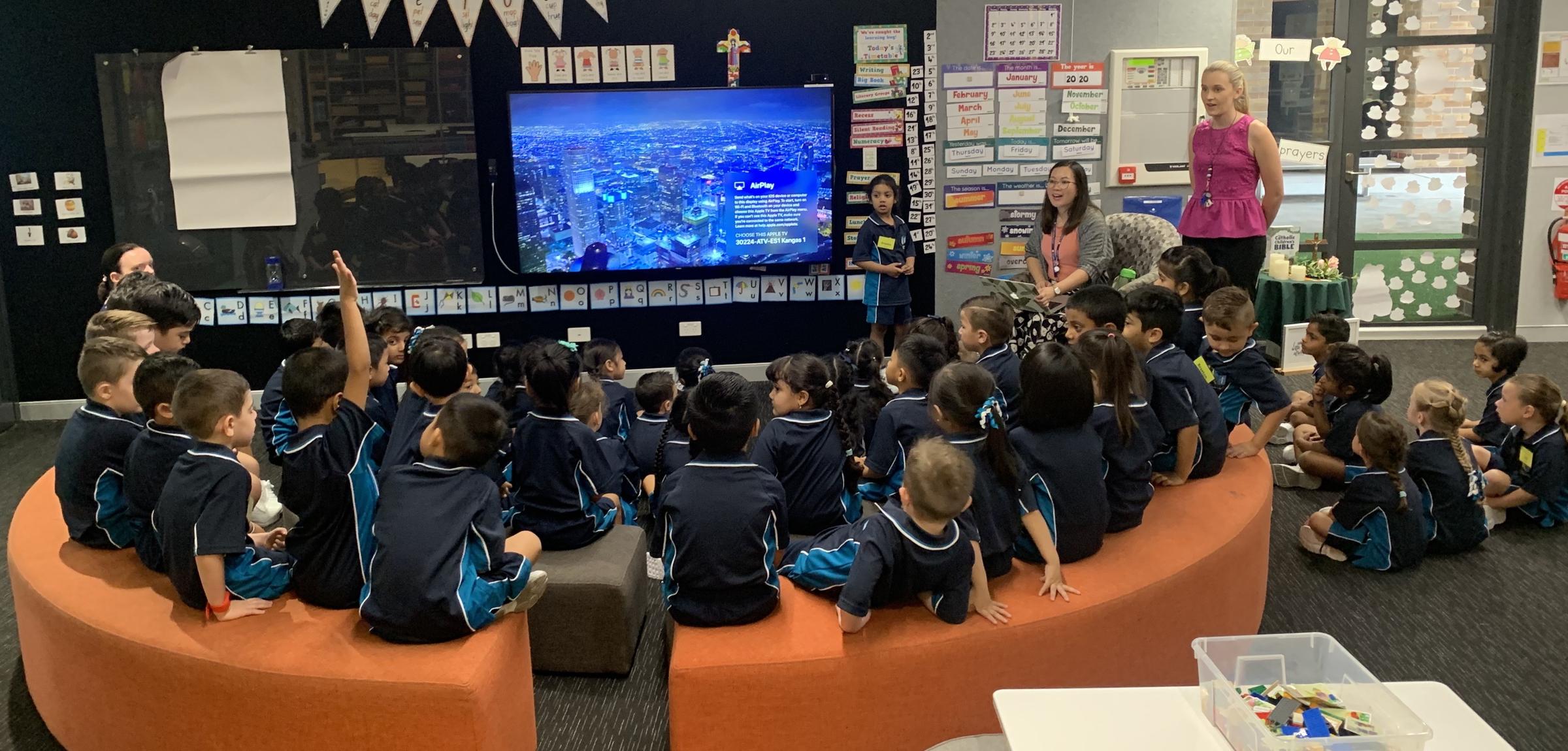
We Love Reading Day is this Wednesday!
Students in Kindergarten to Stage 3 are invited to bring along their favourite book this Wednesday. We would love it if you are able to bring a prop / item to represent your favourite character from the book. An example may be a unicorn headband to represent thelma the unicorn, a wand to represent Harry Potter or a pillow to represent the very Sleep Bear. The prop should be labelled with your child’s name. There will be several fun Literacy based activities such as Guess My Character, a group writing challenge and a Book Title Quiz Show!
Students are to wear regular school uniform on the day. Don’t forget to check out the St Luke’s Facebook page for some snapshots of the fun!
ES1
Kindergarten Love Reading!
The progress and achievement of our Kindergarten students this year has been amazing! With the support of our fabulous teachers, our students have grown into wonderful readers. Across the year, students have had the opportunity to develop their understanding of many reading strategies. Many of our students now independently apply other strategies such as self correcting when something does not make sense, sliding through sounds in words and reading with fluency. With the school holidays fast approaching, we encourage you to support your child to continue reading throughout the break to prevent the ‘Summer Slide’.
What is the Summer Slide?
The ‘Summer Slide’ refers to the decline in reading skills that can occur over the holiday break when students are not at school. Numerous studies show that children who do not read during the holidays actually slip in reading skills by the time that school begins again the next year.
Be creative in the ways that your can encourage your child to read during the holidays. Ask them to write to friends and relatives that they have not seen for a while, invite them to follow a recipe for a special Christmas treat or review some Christmas purchases. Books are a great Christmas gift and your child will also have access to the PM eCollection and sunshine online.
Numeracy
This week Kindergarten have been working on addition and subtraction. They have been using equipment and recording their thinking in both words and numbers. Arranging their collection into rows or arrays helps the students to visually notice patterns and helps them to remember number facts. Some students have also made the connection between the two operations eg 6+ 4 = 10 and 4+6=10 and some have even made the connection with subtraction eg 10-4 =6.
What do our Kindy students have to say about their year in Kindergarten?
Finishing Kindergarten can be an exciting time for students but also a little sad. We are thankful for the learning that has taken place, the friendships made and the good times we have shared together.
Some Kindergarten students were asked about what they had enjoyed most about their year. Here is what some of our Kindergarten students had to say.
Ria S: I loved learning to write the best. I can write 5 sentences and I use describing words!
Aaron O: The best thing about Kindergarten was playing with my friends.
Isabella: My teacher always gives us good activities. I like painting, reading activities and making roads for B Bots.
Amelia S: My teachers have helped me so much. They taught me to write and do maths. They are great teachers.
Chaya P: I like playing with my friends the best. We play hide and seek and fun games on the playground.
Sebastian B: I can write now! I can write stories and information too.
Some students may become a little anxious about what next year will look like. Assure your child that they will have many familiar faces in their class next year and that they can play with their friends at school every day on the playground. Talk to your child about how they will already be familiar with many things (like guided reading, writing goals, brain breaks and maths warm ups just to name a few) but there will also be some new and exciting things too.
STAGE 1
Reading and bonding
Many parents ask what can they do with their child to help with their learning in the holidays? The answer is pretty simple and easy- encourage them to read as much as possible and spend quality time talking to them and experiencing the world.
Reading and practice with reading is the best way to keep children’s reading skills and confidence as a reader up. What is better is if you can find something that your child loves reading and wants to read. Motivation to read is key for your sanity and for your child to maintain their skills and knowledge. Explore different genres of books, ask in book shops, expose your child to your favourite books as a child yourself or even ask other friends what their child likes reading to get ideas and find that special text that will open the floodgates to motivation to want to read. Read books together and model to your child your own love of reading- that can only help plus then you are getting the opportunity to relax and unwind a bit over the holidays too!
Nothing is more important than oral language with young children. The more exposure and use of the English language (or their language spoken at home) they get, the more capable readers and writers they will become. Giving your child life experiences in a variety of places and settings and talking to them about it gives them things they can relate to, learn from and use as experiences to draw on in their life. Especially after this year- get out and see and experience what Australia (or at least NSW) has to offer. Talk to your child about where you are going, what you are doing and seeing, their thoughts and feelings and share your own personal experiences and thoughts/ feelings with them. The more they can relate to something the better their oral language ability will become. Even if you can’t travel far, spend time together- play board games, make believe play with them, play sport at the park- anything to be active and be able to talk to each other.
Have fun with your children in the holidays- you all deserve it!
3D Objects
In Wizard’s World students have explored the concept of 3D objects. It was recognised that 3D objects are in our everyday lives. Students investigated the playground and noticed objects such as cones, cylinders and spheres. This was a great learning opportunity for Stage 1 as they made connections between their learning and their everyday world.
Stage 2
Science Inquiry
The students have been carrying out an inquiry unit about forces this term. They have engaged in a variety of experiments and are learning about various forces. The students will be creating their own model that will demonstrate forces. They are using a design thinking process to achieve this and are creating prototypes, receiving feedback and amending the models to suit their feedback. The students will then build and test their models. They are looking forward to presenting their models to their peers and parents through Seesaw.
Photo: Prototype Collage
English: Supporting Learning at Home
This year in Stage 2 we have been focusing on seven strategies for improving reading comprehension. These are:
- Using Prior Knowledge;
- Visualising;
- Questioning;
- Making Connections, including
- Text to Self
- Text to Text
- Text to World;
- Inferring;
- Summarising; and
- Synthesising.
A strategy you could focus on at home when your child is reading a book is questioning. Readers can ask and answer questions before, during, and after their reading.
Asking and answering questions BEFORE reading fiction texts may look like the following:
- What will this book be about? How do you know?
- What is the title of this story? What clues does the title give about the story?
- Who is the author? What does the author do? Who is the illustrator? What does the illustrator do?
- What do you think will happen in this story? What gave you that idea?
For non-fiction texts, they may look like like the following:
- Why are you reading this? What are you hoping to learn or find out?
- What do you already know about this topic?
- What do you think you will learn by previewing the photos in this book?
The following questions could be asked DURING the read of a fiction text:
- What do you think will happen next? How do you think (character) will react?
- How would you feel if that happened to you?
- What would you have done if you were the character?
- What pictures have you been seeing in your mind?
- Can you predict what will happen next?
- What does the main character want to happen?
- How do the illustrations explain what is happening in the story?
The following questions could be asked DURING the read of a non-fiction text:
- Why does the author tell you _____?
- What is the most important idea?
- How do the pictures/maps/illustrations help you understand the words?
- Are there bold words? Italics? Why?
- What information does this add?
- Can you tell what the author feels about this topic? How do you know?
- Does this remind you of anything in your life? What?
- What does ______ mean? Can you show me the text where you learned that?
The following questions could be asked AFTER the read of a fiction text:
- What is the most important thing that happened in the story (or the chapter)?
- Why did the author write this story? What did they want you to learn?
- Can you retell the story in your own words?
- What do you think will happen to the main character after this story is over?
- Were your predictions correct? Why or why not?
- How is this story/character like a different story/character?
The following questions could be asked AFTER the read of a non-fiction text:
- What was the most interesting thing to you about this topic? Why?
- What words or ideas do you still not understand?
- Now that you’ve read this, what do you want to learn about next?
- What would you re-title this book/article?
- Can you tell what happened in order? (if applicable)
- Did you agree or disagree with the ideas? Why?
- If you were going to share a fact from this with someone else, what would you tell them?
- What questions would you ask the author?
Religion
In Religion, Stage 2 has been discussing how the Holy Spirit guides us in our life and the Grace we receive from God. We are learning about the Sacraments, why they exist, what they mean and how they relate to our life. Some of the big ideas that we are beginning to appreciate are:
- Signs and symbols represent an invisible reality;
- God's grace, through the Holy Spirit, is present in and through the Sacraments;
- Sacraments and Sacramentality are a gift from God;
- Sacraments nourish the life and integrity of an intentional faith community; and
- We can be signs and symbols of God's grace in our world
To faciliate this learning, Stage 2 were given the opportunity to research a Sacrament of their choosing where we receive God’s Grace. To support this and put our faith into action Stage 2 have created videos to promote the St Vincent De Paul appeal around the school. These videos will appear on social media over the coming weeks as well as being played to various classes at different times.
Mathematics
In maths this week we are exploring the concept of volume and capacity. Volume is the amount of space a 3D shape takes up. Capacity is the amount that something can hold. The big ideas for our learning are:
- Identifying the difference between volume and capacity;
- Using a formal unit when measuring volume and capacity (L,mL, cm3); and
- Estimating and measuring volume.
We have been working mathematically by visualising in tasks like the one below. How would you work this out?
